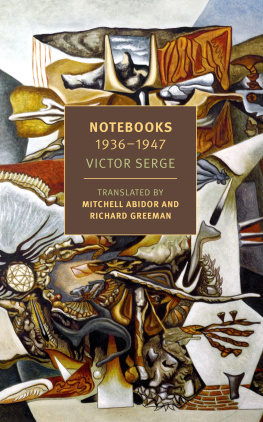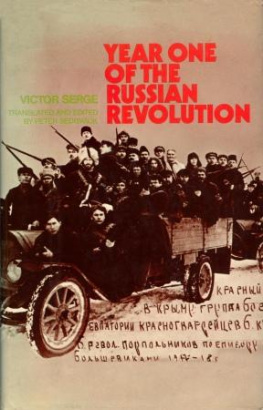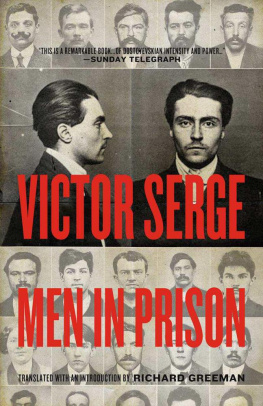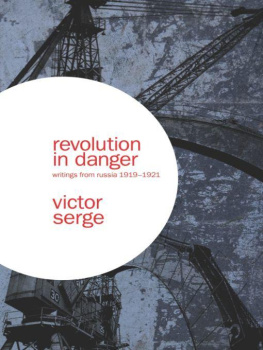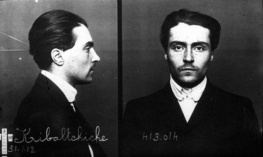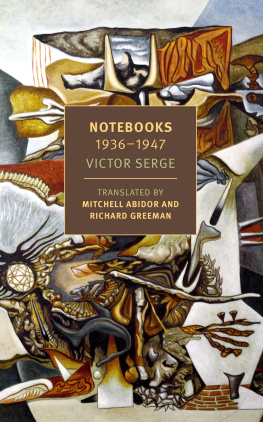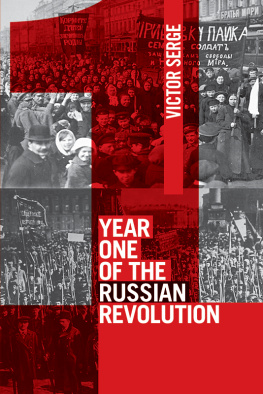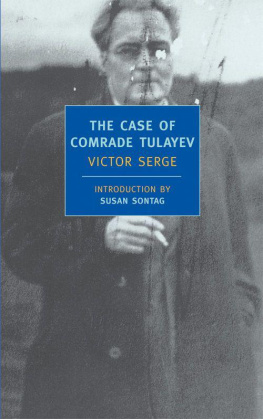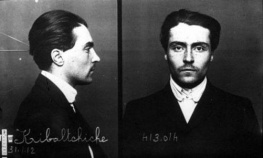Victor Serge - Notebooks: 1936-1947
Here you can read online Victor Serge - Notebooks: 1936-1947 full text of the book (entire story) in english for free. Download pdf and epub, get meaning, cover and reviews about this ebook. year: 0, publisher: NYRB Clasics, genre: Detective and thriller. Description of the work, (preface) as well as reviews are available. Best literature library LitArk.com created for fans of good reading and offers a wide selection of genres:
Romance novel
Science fiction
Adventure
Detective
Science
History
Home and family
Prose
Art
Politics
Computer
Non-fiction
Religion
Business
Children
Humor
Choose a favorite category and find really read worthwhile books. Enjoy immersion in the world of imagination, feel the emotions of the characters or learn something new for yourself, make an fascinating discovery.
- Book:Notebooks: 1936-1947
- Author:
- Publisher:NYRB Clasics
- Genre:
- Year:0
- Rating:3 / 5
- Favourites:Add to favourites
- Your mark:
- 60
- 1
- 2
- 3
- 4
- 5
Notebooks: 1936-1947: summary, description and annotation
We offer to read an annotation, description, summary or preface (depends on what the author of the book "Notebooks: 1936-1947" wrote himself). If you haven't found the necessary information about the book — write in the comments, we will try to find it.
Notebooks: 1936-1947 — read online for free the complete book (whole text) full work
Below is the text of the book, divided by pages. System saving the place of the last page read, allows you to conveniently read the book "Notebooks: 1936-1947" online for free, without having to search again every time where you left off. Put a bookmark, and you can go to the page where you finished reading at any time.
Font size:
Interval:
Bookmark:

VICTOR SERGE (18901947) was born Victor Lvovich Kibalchich to Russian anti-czarist exiles, impoverished intellectuals living by chance in Brussels. A precocious anarchist firebrand, young Victor was sentenced to five years in a French penitentiary in 1912. Expelled to Spain in 1917, he participated in an anarcho-syndicalist uprising before leaving to join the Revolution in Russia. Detained for more than a year in a French concentration camp, Serge arrived in St. Petersburg early in 1919 and joined the Bolsheviks, serving in the press services of the Communist International. An outspoken critic of Stalin, Serge was expelled from the Party and briefly arrested in 1928. Henceforth an unperson, he completed three novels (Men in Prison, Birth of Our Power, and Conquered City) and a history (Year One of the Russian Revolution), all published in Paris. Arrested again in Russia and deported to Central Asia in 1933, he was allowed to leave the USSR in 1936 after international protests by militants and prominent writers like Andr Gide and Romain Rolland. Using his insiders knowledge, Serge published a stream of impassioned, documented exposs of Stalins Moscow show trials and machinations in Spain, which went largely unheeded. Stateless, penniless, hounded by Stalinist agents, Serge lived in precarious exile in Brussels, Paris, Vichy France, and Mexico City, where he died in 1947. His classic Memoirs of a Revolutionary and his great last novels, Unforgiving Years and The Case of Comrade Tulayev (both available as NYRB Classics), were written for the desk drawer and published posthumously.
MITCHELL ABIDOR is a historian and translator of French, Spanish, Italian, Portuguese, and Esperanto. Among the books he has edited and translated are an anthology of Victor Serges anarchist writings, Anarchists Never Surrender; Jean Jaurss Socialist History of the French Revolution; and May Made Me: An Oral History of the 1968 Uprising in France. He was born in Brooklyn, New York, where he still lives.
RICHARD GREEMAN has translated and written the introductions for five of Serges novels (including Unforgiving Years and Conquered City, both available as NYRB Classics). A veteran socialist and co-founder of the Praxis Center and Victor Serge Library in Moscow (www.praxiscenter.ru), Greeman is the author of the website the Invisible International (bit.ly/invisible-international).
NOTEBOOKS
19361947
VICTOR SERGE
Edited by
CLAUDIO ALBERTANI and CLAUDE RIOUX
Translated from the French by
MITCHELL ABIDOR and RICHARD GREEMAN
NEW YORK REVIEW BOOKS

New York
THIS IS A NEW YORK REVIEW BOOK
PUBLISHED BY THE NEW YORK REVIEW OF BOOKS
435 Hudson Street, New York, NY 10014
www.nyrb.com
Copyright 2012 by ditions Agone, Marseille, France
Translation copyright 2019 by Mitchell Abidor and Richard Greeman All rights reserved.
Cover image: Gunther Gerzso, Lcartel (El descuartizado), 1944; John Michael Gerzso. Collection of John and Sandy Fox.
Cover design: Katy Homans
The introduction to the present volume, originally published in the French edition of the Notebooks, is copyright 2012 by Claudio Albertani and Jean-Guy Rens. It appears here in edited form.
Cet ouvrage a bnfici du soutien des Programmes daide la publication de lInstitut Franais.
This work, published as part of a program of aid for publication, received support from the Institut Franais. It also received support from the Mission Culturelle et Universitaire Franaise aux Etats-Unis, a department of the French Embassy in the United States.
Library of Congress Cataloging-in-Publication Data
Names: Serge, Victor, 18901947, author. | Albertani, Claudio, writer of introduction. | Rens, Jean-Guy, 1946 writer of introduction. | Abidor, Mitchell, translator. | Greeman, Richard, translator.
Title: Notebooks : 19361947 / by Victor Serge ; introduction by Claudio Albertani and Jean-Guy Rens ; translated by Mitchell Abidor and Richard Greeman.
Description: New York : New York Review Books, [2019] | Series: New York Review Books classics.
Identifiers: LCCN 2018029769 (print) | LCCN 2018054439 (ebook) | ISBN 9781681372716 (epub) | ISBN 9781681372709 (alk. paper)
Subjects: LCSH: Serge, Victor, 18901947TravelMexico. | Serge, Victor, 18901947Notebooks, sketchbooks, etc.
Classification: LCC PQ2637.E49 (ebook) | LCC PQ2637.E49 A2 2019 (print) | DDC 813/.54dc23
LC record available at https://lccn.loc.gov/2018029769
ISBN 978-1-68137-271-6
v1.0
For a complete list of titles, visit www.nyrb.com or write to:
Catalog Requests, NYRB, 435 Hudson Street, New York, NY 10014
M EMOIRS of a Revolutionary, generally considered to be Victor Serges masterpiece, is a work of ambiguous literary character, existing on the borderline between history and individual testimony. As a record of their authors itinerary, the memoirs cannot be taken entirely at face value. Serges Notebooks are more intimate in character. They introduce us to the cultural and aesthetic universe of his everyday life, while forming the first stratum of his whole body of work, literary and historical, the foundation of a writing that strives throughout to establish direct contact with reality. Here the authenticity of the man, with all his passions and obsessions, emerges with clarity and in complete contrast to the accusations of duplicity that have been leveled against him. Serge was an anarchist, a Bolshevik, and, finally, a Left Oppositionist. He was close to Trotskyism but never, properly speaking, a Trotskyist: Safeguarding individual freedom within the revolution remained too important to him. He walked a political razors edge with his eyes wide open. It came at the price of his well-being and, on several occasions, his freedom. Serges work as a writer remains credible because it was never in the service of an ideology or any kind of preestablished solution.
The Notebooks are the laboratory in which Serge elaborated the universe of an I in permanent relation with the we that surrounds it, furnishing a glimpse of the tragic stage of revolutions continually betrayed and reborn. Central to them are the contradictions between the fragility of the subject and the demands of collective action. If Serge speaks constantly of himself, it is not to air his personal difficulties but rather to make clear his perspective as a narrator, his place on the global chessboard. On page after page, the Notebooks demonstrate a stubborn fidelity, a total allegiance, and a passionate attachment to the revolutionary project. This places Serge in the company of George Orwell; it makes him the complete opposite of Arthur Koestler. I hate the role of victim, Serge often said. A necessity that resembles complicity often binds a victim to his torturer, the man on the scaffold to his executioner, he wrote in his novel Unforgiving Years. Far from bemoaning his fate or denigrating his persecutors (and God knows he had them), he sought on an ongoing basis to deepen the knowledge required to enrich socialist culture. In the Notebooks, for example, we see how seriously Serge studies Mesoamerican cultures, Mexican geology, even psychoanalysis.
The Notebooks begin in Marseille in 1940, in the immediate aftermath of the Nazi occupation of France. Serge has been taken in hand by Varian Frys Emergency Rescue Committee. His first plan was to emigrate to the United States, but his anarchist and Bolshevik past constituted a major hindrance, and in spite of having the support of John Dewey, Max Eastman, and Sidney Hook, he was denied a visa. At this point, the Mexican option emerged, Mexico being one of the few countries still granting asylum to political refugees. Julin Gorkin, the leader of the Spanish Partido Obrero de Unificacin Marxista (POUM, or Workers Party of Marxist Unification), was in exile in Mexico where he sought to handle the administrative formalities necessary to gain entry for Serge and his family. In the United States, Dwight and Nancy Macdonald were in touch with Frank Tannenbaum, a former union activist and an adviser to the Mexican president Lzaro Crdenas.
Font size:
Interval:
Bookmark:
Similar books «Notebooks: 1936-1947»
Look at similar books to Notebooks: 1936-1947. We have selected literature similar in name and meaning in the hope of providing readers with more options to find new, interesting, not yet read works.
Discussion, reviews of the book Notebooks: 1936-1947 and just readers' own opinions. Leave your comments, write what you think about the work, its meaning or the main characters. Specify what exactly you liked and what you didn't like, and why you think so.

